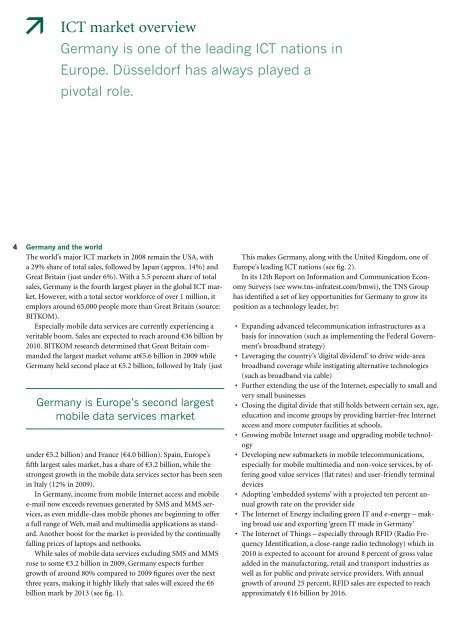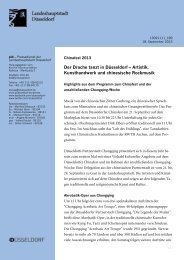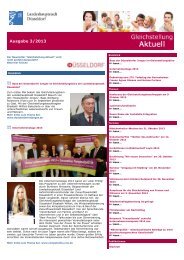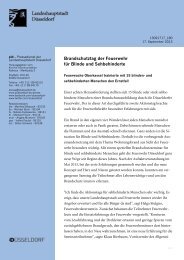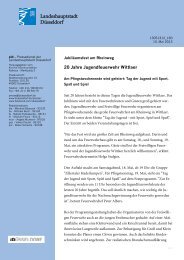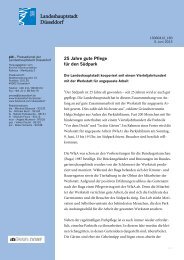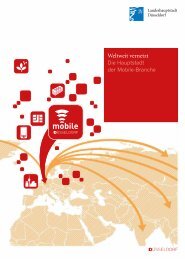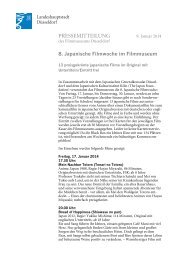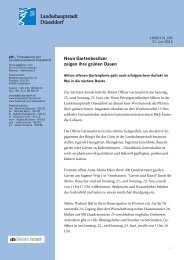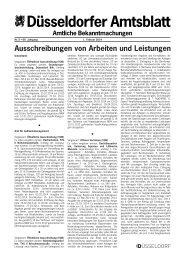Düsseldorf - Sector profile Information technology and ...
Düsseldorf - Sector profile Information technology and ...
Düsseldorf - Sector profile Information technology and ...
Create successful ePaper yourself
Turn your PDF publications into a flip-book with our unique Google optimized e-Paper software.
ICT market overview<br />
Germany is one of the leading ICT nations in<br />
Europe. <strong>Düsseldorf</strong> has always played a<br />
pivotal role.<br />
4 Germany <strong>and</strong> the world<br />
The world’s major ICT markets in 2008 remain the USA, with<br />
a 29% share of total sales, followed by Japan (approx. 14%) <strong>and</strong><br />
Great Britain (just under 6%). With a 5.5 percent share of total<br />
sales, Germany is the fourth largest player in the global ICT market.<br />
However, with a total sector workforce of over 1 million, it<br />
employs around 65,000 people more than Great Britain (source:<br />
BITkOM).<br />
Especially mobile data services are currently experiencing a<br />
veritable boom. Sales are expected to reach around €36 billion by<br />
2010. BITkOM research determined that Great Britain comm<strong>and</strong>ed<br />
the largest market volume at€5.6 billion in 2009 while<br />
Germany held second place at €5.2 billion, followed by Italy (just<br />
Germany is Europe’s second largest<br />
mobile data services market �<br />
under €5.2 billion) <strong>and</strong> France (€4.0 billion). Spain, Europe’s<br />
ffth largest sales market, has a share of €3.2 billion, while the<br />
strongest growth in the mobile data services sector has been seen<br />
in Italy (12% in 2009).<br />
In Germany, income from mobile Internet access <strong>and</strong> mobile<br />
e-mail now exceeds revenues generated by SMS <strong>and</strong> MMS services,<br />
as even middle-class mobile phones are beginning to offer<br />
a full range of Web, mail <strong>and</strong> multimedia applications as st<strong>and</strong>ard.<br />
Another boost for the market is provided by the continually<br />
falling prices of laptops <strong>and</strong> netbooks.<br />
While sales of mobile data services excluding SMS <strong>and</strong> MMS<br />
rose to some €3.2 billion in 2009, Germany expects further<br />
growth of around 80% compared to 2009 fgures over the next<br />
three years, making it highly likely that sales will exceed the €6<br />
billion mark by 2013 (see fg. 1).<br />
This makes Germany, along with the United kingdom, one of<br />
Europe’s leading ICT nations (see fg. 2).<br />
In its 12th Report on <strong>Information</strong> <strong>and</strong> Communication Economy<br />
Surveys (see www.tns-infratest.com/bmwi), the TNS Group<br />
has identifed a set of key opportunities for Germany to grow its<br />
position<br />
as a <strong>technology</strong> leader, by:<br />
• �Exp<strong>and</strong>ing<br />
advanced telecommunication infrastructures as a<br />
basis for innovation (such as implementing the Federal Government’s<br />
broadb<strong>and</strong> strategy)<br />
• �Leveraging<br />
the country’s ‘digital dividend’ to drive wide-area<br />
broadb<strong>and</strong> coverage while instigating alternative technologies<br />
(such as broadb<strong>and</strong> via cable) �<br />
• �Further<br />
extending the use of the Internet, especially to small <strong>and</strong><br />
very small businesses<br />
• �Closing<br />
the digital divide that still holds between certain sex, age,<br />
education <strong>and</strong> income groups by providing barrier-free Internet<br />
access <strong>and</strong> more computer facilities at schools.<br />
• �Growing<br />
mobile Internet usage <strong>and</strong> upgrading mobile <strong>technology</strong><br />
�<br />
• �Developing<br />
new submarkets in mobile telecommunications,<br />
especially for mobile multimedia <strong>and</strong> non-voice services, by offering<br />
good value services (fat rates) <strong>and</strong> user-friendly terminal<br />
devices<br />
• �Adopting<br />
‘embedded systems’ with a projected ten percent annual<br />
growth rate on the provider side �<br />
• �The<br />
Internet of Energy including green IT <strong>and</strong> e-energy – making<br />
broad use <strong>and</strong> exporting ‘green IT made in Germany’ �<br />
• �The<br />
Internet of Things – especially through RFID (Radio Frequency<br />
Identifcation, a close-range radio <strong>technology</strong>) which in<br />
2010 is expected to account for around 8 percent of gross value<br />
added in the manufacturing, retail <strong>and</strong> transport industries as<br />
well as for public <strong>and</strong> private service providers. With annual<br />
growth of around 25 percent, RFID sales are expected to reach<br />
approximately €16 billion by 2016.


